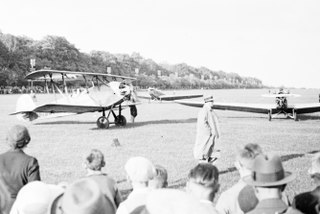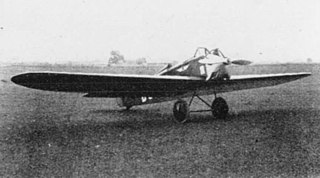
The Focke-Wulf Fw 44 is a 1930s German two-seat biplane known as the Stieglitz ("Goldfinch"). It was produced by the Focke-Wulf company as a pilot training and sport flying aircraft. It was also eventually built under license in several other countries.

The Siemens-Schuckert D.IV was a late-World War I fighter aircraft from Siemens-Schuckert (SSW). It reached service too late and was produced in too few numbers to have any effect on the war effort.

VL Viima, constructed by the State Aircraft Factory is a Finnish two-seat, biplane trainer used by the Finnish Air Force from the late 1930s to the early 1960s. After military service, several were released into civil use.

The Siemens-Halske Sh 12 was a nine-cylinder, air-cooled, radial engine for aircraft built in Germany in the 1920s. First run in 1925, it was rated at 80 kW (110 hp). The Sh 12 was also produced in the United States by Ryan Aeronautical Corp. as the Ryan-Siemens 9.
The Siemens-Halske Sh 11 was a seven-cylinder, air-cooled, radial engine for aircraft built in Germany in the 1920s. First run in 1925, it was rated at 75 kW (100 hp).

The Siemens-Schuckert D.I was a single-seat fighter built by Siemens-Schuckert Werke in 1916. It was a German copy of the French Nieuport 17 that was obsolete by the time it was available in numbers, so that it served mainly as an advanced trainer.

The Focke-Wulf S 24 Kiebitz was a sport aircraft built in Germany in the later 1920s. It was a single-bay biplane of conventional design with equal-span, unstaggered wings, braced with N-type interplane struts. The pilot and a single passenger sat in tandem open cockpits, and it was fitted with a fixed tailskid undercarriage. The wings could be folded for transportation or storage, and the aircraft was designed to be towed by a car.

The Bayerische Flugzeugwerke M 18, was an airliner, produced in Germany in the late 1920s.

The BFW M.23, sometimes known as the Messerschmitt M 23, was a 1920s two-seat sporting aircraft designed by Willy Messerschmitt, and produced by Bayerische Flugzeugwerke (BFW). Examples won several prestigious races in 1929 and 1930.
The BFW M.22 was a twin-engined medium bomber, designed by Willy Messerschmitt for the German Ministry of Transport. It was one of only two biplanes Messerschmitt designed, both unsuccessful.
The Udet U 11 Kondor was a German four-engined airliner designed and built by Udet Flugzeugbau, only one was built.

The Siemens-Schuckert DDr.I was a World War I German twin engine, push-pull configuration triplane fighter aircraft. Only one was built, crashing on its first flight.
The Pfalz D.VII was a German biplane fighter aircraft from World War I. It was not put into production.

The LFG Roland D.IX was a World War I German single seat fighter aircraft, a biplane powered by one of a new generation of powerful rotary engines. Three slightly different prototypes were built but there was no series production.

The Albatros L.71 was a two-seat, single pusher engined biplane built in Germany in the 1920s.
The Siemens-Schuckert B was an unarmed German two seat reconnaissance biplane built early in World War I. A single example was delivered but soon lost.

The Udet U 1 is a single seat monoplane built by the German Ace Ernst Udet.
Udet Flugzeugbau GmbH was an aircraft manufacturer founded in the summer of 1921 in Munich by Ernst Udet with Henry Hans Herrmann and Erich Scheuermann, funded by the American financier William Pohl, designing and building light sport and commercial aircraft, within the limitations of the Versailles Treaty.

The parasol wing, single engine Udet U 8, sometimes referred to as the Limousine, was a three-seat commercial passenger transport designed and built in Germany in 1924. Five were produced and were used by German airlines until about 1928.

The Raab-Katzenstein KL.1 Schwalbe (Swallow) was a German two-seat biplane produced in the 1920s. About fifty were built and the type became well known as an aerobatic aircraft, performing at many displays in the hands of pilots like Gerhard Fieseler.

















